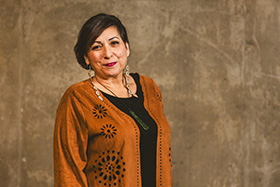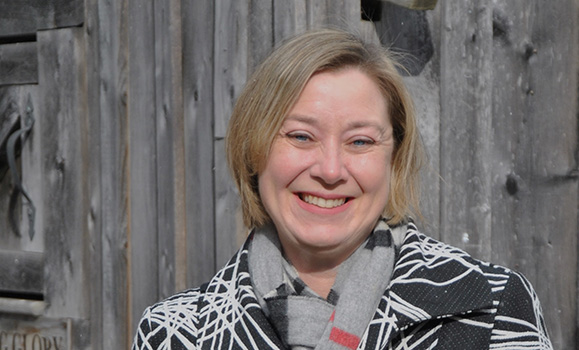Stacy Allison-Cassin, an assistant professor in Dal‚Äôs Faculty of Management, and Camille Callison, university librarian at University of the Fraser Valley, have received a $1.8-million grant from the prestigious Mellon Foundation. They are pursuing the next steps in a decades long journey to remove antiquated, racist, and harmful language found in libraries, archives, museums, and data-systems worldwide.‚ÄØ‚ÄجÝ
 Dr. Allison-Cassin, a citizen of the M√©tis Nation of Ontario, and Callison, a member of the TƒÅ≈ÇtƒÅn Nation, are co-leading the Respectful Terminologies Platform Project (RTPP) with the National Indigenous Knowledge and Language Alliance (NIKLA), in collaboration and with the support of the University of the Fraser Valley.¬Ý¬Ý
Dr. Allison-Cassin, a citizen of the M√©tis Nation of Ontario, and Callison, a member of the TƒÅ≈ÇtƒÅn Nation, are co-leading the Respectful Terminologies Platform Project (RTPP) with the National Indigenous Knowledge and Language Alliance (NIKLA), in collaboration and with the support of the University of the Fraser Valley.¬Ý¬Ý
Shown right: Camille Callison
The RTTP is a dynamic and open online platform to create and share appropriate and respectful multilingual terminologies. That terminology will then be used in places such as libraries, museums, and other knowledge-based organizations with archival management systems.‚ÄØ‚ÄجÝ
Dr. Allison-Cassin and Callison explain the significance of the project like this.‚ÄØ‚ÄجÝ
To be called by one‚Äôs name is a fundamental mark of respect that should be extended to everyone. However, the stark reality is that many are denied this basic human right... people are compelled to use harmful language to conduct a search for one‚Äôs own history, heritage, language, or culture.‚ÄØ‚ÄØ‚ÄØ‚ÄجÝ
‚ÄØChange is ‚Äòfrustratingly slow‚Äô¬Ý
Elaine MacInnis, associate dean of library services at Dal, is dismayed that ‚ÄúAmerican Indians is still a subject heading in the library catalogue system.‚Äù Not only is the language incorrect, she says, but it also inflicts harm and continues the cycle of trauma.‚ÄجÝ
Cataloguing and descriptive work in libraries and archives uses international standards intended to ease data exchange and guide practitioners. Many of these standards were developed by colonial institutions. Some, like the U.S. Library of Congress and the Canadian government, have tried to address disrespectful, incorrect, and harmful words, but Dr. Allison-Cassin calls the change ‚Äòfrustratingly slow‚Äô, and such efforts are typically not led by Indigenous peoples themselves.¬Ý¬Ý
Drawing on years as a librarian, she says, ‚Äúit‚Äôs impossible to decolonize these systems.‚Äù Changing terms within a colonial system is not enough, she adds, ‚Äúbecause the underlying structures remain the same ‚Äî it‚Äôs time to create something new.‚Äù‚ÄØ‚ÄجÝ

Dr. Stacy Allison-Cassin.
A collective approach, no more working in silos¬Ý
The RTPP imagines a different reality where, as Callison puts it, ‚Äúwhen people search for information about Indigenous and other marginalized communities, they would see appropriate and correct terminology describing themselves and others, which subconsciously creates respect toward them and their identity, leaving an imprint of reverence.‚Äù‚ÄØ‚ÄØ‚ÄجÝ
It‚Äôs taken nine months of intense work to do the invite-only application to the Public Knowledge Program at Mellon. But as Dr. Allison-Cassin explains, the project has long roots. The RTPP was launched through NIKLA in May 2022 and follows decades of advocacy and research by Indigenous librarians, archivists, and museum professionals across North America.¬Ý¬Ý
The grant will be used for the design of practices, workflows, and systems to create the capacity for systematic change. Dr. Allison-Cassin says, ‚Äúit‚Äôs also about Indigenous Data Sovereignty having the right to own, control, access, and steward data about their communities, lands, and culture.‚Äù‚ÄجÝ
W. Dominika Wranik, the Faculty of Management‚Äôs associate dean of research, says it‚Äôs an honour for the university to be associated with the project.¬Ý¬Ý
"It‚Äôs in direct alignment with Dalhousie University‚Äôs Strategic Research Direction, specifically in the area ‚ÄòReconciliation & Indigenous Peoples‚Äô that supports the building of inclusive and resilient communities,‚Äù she says, adding that Dr. Allison-Cassin's research "also lies at the core of our faculty‚Äôs strength in the advancement of Indigenous paradigms for management and the decolonization of knowledge.‚Äù ‚ÄجÝ
We want to fulfill the dreams of our elders¬Ý
Callison acknowledges the broad support the project has gathered with contributions coming from across Canada and beyond. ‚ÄúIt is important to gathering together in a concerted, overarching efforts to address these historical harms enabling local adaptations rather than continue to work in silos ensuring that our efforts at creating and mobilizing efforts move forward into the future in a good way," she says. ‚ÄØ‚ÄØ‚ÄجÝ
As a scholar who has volunteered hours writing and editing material for Wikidata and Wikipedia, Dr. Allison-Cassin admits she’s passionate about documenting cultural materials that don’t fit easily into standard systems of description or are ignored entirely. She says knowing ‘how information is structured’ helps her think about ‘the power in structures.’
Dr. Allison-Cassin says that the work of so many people over past decades is what enabled the RTPP to come into being. Callison emphasizes, ‚ÄúOur desire is to acknowledge and honour the work of those who came before us who worked tirelessly at the grassroots and in community for their whole careers to advocate and create changes that is a foundation that we can build. It is critically important to elevate the voices of First Nations, M√©tis, Inuit peoples who have been and continue to work to create change for future generations to come.‚Äù‚ÄØ‚ÄجÝ
